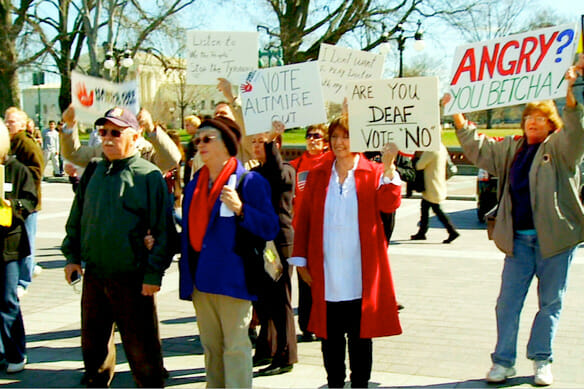
While there is no hard and fast rule that says documentaries must be as objective as, say, mainstream journalism, it is refreshing to find one that tries so hard to repel bias, particularly when covering the nasty realm of politics.
Patriocracy is the third documentary film by director Brian Malone, preceded by Intelligent Life: Change Your Mind, Change Your World (2009) and Breaking News (2006). His latest effort is a thought-provoking, glossy documentary from start to finish, and one that seems more interested in observing a clash of agendas than promoting one.
Patriocracy addresses the growing issue of polarization between political parties and groups in the United States. It takes a brutal look at the vocal displays of anger and disillusionment found on streets as well as government offices across the country and asks, “How did it get so bad?”
At this stage, a skeptic might hold out for proof that things really are so terrible—after all, there is nothing wrong with a bit of healthy debate, right? Even the Founding Fathers didn’t always agree. Politics have always been and always will be an arena ripe for passionate disagreement.
This film quickly erodes the skeptic’s view, however, by delivering a stream of clips of hysterical people rallying to insult one another, ranting and screaming about who really loves America. It is uncomfortable, embarrassing and utterly convincing in getting the point across that yes, things really are much worse than ever before, on both sides of the party line.
The filmmakers spend the remainder of their time explaining how things got so out of hand, a problem which they claim mostly stems from President Obama’s election and the coinciding economic downturn. People’s desperation coupled with the fear-mongering bias of political “news” shows is a perfect recipe for pandemonium, according to Patriocracy. These theories are well documented through a series of thoughtful interviews with a wide range of political figures and journalists, punctuated with helpful graphics and news clips.
These political experts expand on several factors they see as adding to the problem, from the corrupting powers of corporate money to an alarming change in attitudes of the politicians themselves. Certainly, there have always been arguments in the chambers, name-calling, filibustering and complete standoffs of opinion, but as the film brings to light, the representatives know each other less and less, have less respect for one another and thus have less reason to care when they are in attack mode. Obviously, this sets a terrible example for the rest of the country, and is just the spark needed to ignite the fury of political fanatics.
It is a sobering problem indeed, and one that will not be solved easily, as the interviewees express so well.
One question the film does not ask is when should getting along for the sake of getting along take precedence over someone’s sincere beliefs? A person doesn’t have to be a fanatic to feel strongly about an issue and to deserve a measure of respect in sticking to his or her guns, particularly when that resolve is morally, and not politically, driven.
This film covers a lot of material, but only in some parts does it feel too detailed for the average viewer. It takes a special talent to make so much messy information digestible. This is a doc one can chew on for days after, recommending to friends, asking people about and wanting to watch again.
Overall, Patriocracy is a top-notch documentary, well-edited, well-organized, clear and concise and extremely interesting. There are a few points where the pace drags, particularly in the final 20 minutes, but even then there are still valid points being made.
The best-case scenario for a film like Patriocracy would be to gain a TV distribution so its audience might expand beyond political junkies. It would be wonderful piece for journalism or political science students, as well as the general public. And, perhaps, if enough American youth could see more films like it, the current rancorous political environment might finally take a turn for the better.
Director: Brian Malone
Writer: Brian Malone
Starring: Elliot Ackerman, Bob Schieffer, Alan Simpson, Pat Buchanan, Sen. Kent Conrad, Eleanor Clift, Ken Rudin, Sen. Mark Warner
Release Date: Mar. 2, 2012